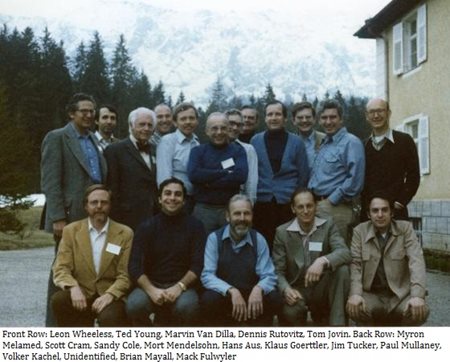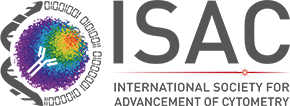Advancing Cytometry for Over Four Decades.
The decision to form a Society for analytical cytology grew out of a series of Engineering Foundation Conferences on Automated Cytology. During the fifth conference, held from December 12-17,1976 in Pensacola, Florida, the attendees agreed that the formation of a Society would provide professional continuity to the field and promote the continuation of the conference series, which had been very successful.
As a result, the organizing committee of the sixth conference, held in Schloss Elmau, Bavaria, Germany, in 1978 (see photo), was empowered to create the Society with the following purpose:
- To promote research, development, and applications in analytical cytometry. Analytical cytometry is broadly defined as the characterization and measurement of cells and cellular constituents for biological, diagnostic, and therapeutic purposes. It embraces components of cytochemistry, cytophysics, anatomy, biology, physiology, pathology, image analysis, instrumentation, clinical laboratory practice, and other subjects of relevance.
- To facilitate integration of the many disciplines within analytical cytometry.
- To disseminate knowledge of analytical cytometry.
- To provide information and advice on those aspects of public policy which are concerned with analytical cytometry.
The officers and councilors of the new Society were:
President: Mortimer L. Mendelsohn
President-Elect: Myron R. Melamed
Honorary Past President: Thomas M. Jovin
Secretary/Treasurer: L. Scott Cram
Editor: Brian H. Mayall
Councilors: Peter H. Bartels, J.S. Ploem, Mack J. Fulwyler, James H. Tucker, Klaus Goerttler, Marvin A. Van Dilla, Paul Mullaney, Leon L. Wheeless, Ian T. Young
The proposed constitution and bylaws were approved by a wide margin and became official in early 1979. The Society was incorporated as a nonprofit corporation on October 6, 1980. The Council decided to hold the first Society meeting under the sponsorship of the Engineering Foundation, which turned out to be the last conference the foundation sponsored. The Society sponsored its own conference for the first time in 1981 in Wentworth, New Hampshire, and has done so ever since.
As interest in the Society grew it became the International Society for Analytical Cytology (ISAC), and in 2006 was renamed the International Society for Advancement of Cytometry. Two articles in Cytometry A by by Phillip N. Dean (published March 1996 and January 2004) and one by Brian Mayall (published January 2004) provide details of the Society and journal’s first 25 years.
History and founding editor’s perspectives of Cytometry
A history of the International Society for Analytical Cytology
ISAC Past Presidents
Jonni Moore – University of Pennsylvania
Andrea Cossarizza – University of Modena and Reggio Emilia
Paul K. Wallace – Roswell Park Comprehensive Cancer Center
Andreas Radbruch – Deutsches Rheuma-Forschungszentrum Berlin
John P. Nolan – La Jolla Bioengineering Institute
Paul J. Smith – Cardiff University
Robert F. Murphy – Carnegie Mellon University
J. Paul Robinson – Purdue University
Maria Pallavicini – University of California Merced
Harry Crissman – Los Alamos National Laboratory
Lisa Staiano-Coico – Temple University
James Watson – Cambridge University
Joe W. Gray – Lawrence Berkeley National Laboratory
Francesco Mauro – ENEA Environ Department
Zbigniew Darzynkiewicz – New York Medical College
Barton L. Gledhill – Lawrence Livermore National Lab
Ole Didrik Laerum – Univ of Bergen Haukeland Hospital, Gade Institute
Kenneth Ault – Maine Medical Center
L. Scott Cram – Los Alamos National Laboratory
Donna Arndt-Jovin – Max Planck Institute for Biophysical Chemistry
Paul Karl Horan – Zynaxis Cell Science, Inc.
Leon L. Wheeless – University of Rochester Medical Center
Paul Mullaney – Oakridge National Laboratory
Myron R. Melamed – New York Medical College
Tom Jovin – Max Planck Institute for Biophysical Chemistry
